Nexus - The Jupiter Incident
The project formerly known, variously, as Beyond, Imperium Galactica III and Galaxy Andromeda finally touches down.
Shop for games now with Simply Games.
"If I was to make a comparison then we wouldn't like to create an Age of Empires, we would like to create a Combat Mission; so your decisions are tactical decisions, not economical decisions that end up in a conflict." Mithis creative director Zsolt Nyulászi - or Nyul, as we're gratefully encouraged to abbreviate - is reflecting on the team's decision to make a space strategy game predicated entirely on combat. He is not, we hastily confirm, trying to tell us that Age of Empires is a bad game. But. He shrugs. "In those games, if you are doing well then you don't need to be a military commander; you just send your units with a tank rush against the enemy and you will win. This is not what we wanted."
Learn To Fly
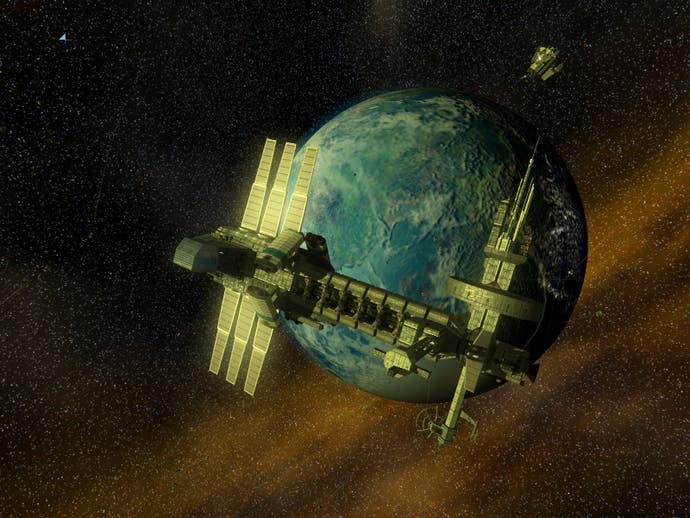
Nexus - The Jupiter Incident, due out on November 5th, is not what you might expect from a space strategy game. "Actually, it's what we call a tactical fleet simulator," says Vincent van Diemen, presenting it to us. That certainly makes a bit more sense. In Nexus, the idea is to control a small fleet of ships, patrolling gorgeous galaxies spoiling for a fight with giant mega-corporations, aliens, whatever your motives dictate. And there's no resource gathering, no building bases, just war. It's all about the tactics, we're told, as Nyul and Vincent take us through a battle, considering the best way to down an enemy ship and settling on, from what we can see on the wall the game's being projected onto, shooting the bejesus out of it while roaring past at speed.
We gawp at the level of micromanagement on offer, and have to concede we're feeling a bit out of our depth. Fortunately, Mithis has taken that into consideration and included a pair of control options. On the one hand there's the full blown ship captain all-hands-on-every-pump approach, which lets you micromanage every element of your ship's control from the very first missions, hurling orders as fast as you can think of them, and trying to direct a multitude of battle-hardened flying breezeblocks (very pretty ones, mind) in some sort of concerted armada. On the other hand, there's the option for Sunday Captains, which puts most of the thinking in the hands of the AI and effectively leaves you to point, shoot and watch the gorgeous battles and cut-scenes that follow, all the while it teaches you how to get on with the more complex stuff so you don't die two or three missions later.
Space Man
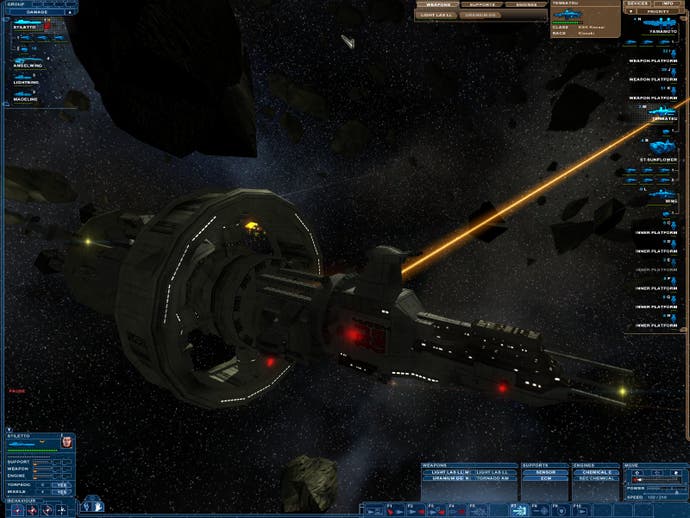
Mithis has high hopes that this simplified control approach will be able to carry Nexus to those players who might shy away from this sort of strategic combat experience, but on balance the story element seems to be far more important to the developer, with van Diemen even going as far as to say, "first of all it's science fiction, then it's a game." It's certainly an interesting yarn, clearly influenced by a wide variety of sci-fi - something that Nyul happily attests to, citing Star Trek, Babylon 5, and others. It all kicks off as we're told about a chap called Richard Cromwell. Cromwell was the first human born in outer space, and, later on in his life, the captain of Noah's Ark, a whimsically named vessel built by man to venture into a wormhole that appears near Earth in 2067. Tooled up with everything needed to forge a colony on the other side of the rift, Noah's Ark disappeared into the wormhole, which promptly collapsed.
The game picks up with Marcus Cromwell, son of Richard, who was only a child when his father left. Marcus joined fleet school just as huge corporations began to tighten their grip on the solar system, and quickly found himself a casualty of the war against interstellar megalomaniacs, left to drift in suspended animation as his ship's debris orbited Mars. Not the world's best start for our hero, then, and it seems typical of his luck when he's awoken in 2110 - having been discovered by pure chance - only to find out that he's been roused up just in time for the next war.
With corporations now permanently on the brink of conflict, Marcus is sent by one of them to investigate strange readings at a competitor, where he discovers another wormhole. Whether compelled, forced or just a poor driver, Marcus winds up heading into the wormhole, and on the other side he encounters the surviving members of his father's colony, lots of aliens, rogue AI computers (AI is illegal at this point, having devastated Earth once before) and plenty of other things that require his attention.
Fight Club
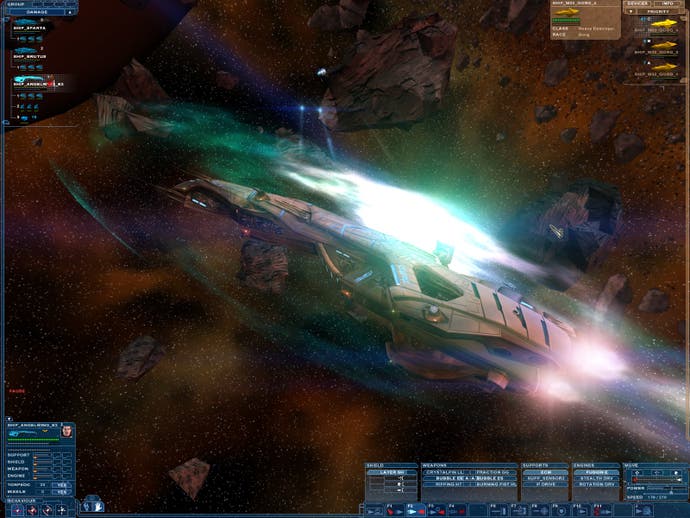
If the combination of the gently-does-it approach and science fiction preamble doesn't pique your interest, perhaps you'll appreciate the depth of the game. "It's more RPG-level in the amount of text we use," van Diemen says. Moreover, it's like the bridge of a warship in terms of control, giving you complete access to everything you could reasonably want to manage and use in crafting tactics to outwit the enemy. Basic controls are, well, basic - once you've grasped the 3D camera control, you just click "Approach" and then click on a craft, a ship icon on the HUD, a navigation point or something of the sort and your ship - or ships - will make a line for it. Attacking enemies and performing reconnaissance is similarly obvious.
Beyond that though, you also have as much micromanagement as you could possibly want. You can target individual weapons on an enemy ship, regulate power levels so that your shields and weapons are in a useful balance, and activate specific engines and countermeasures amongst a host of other things. The idea is to kill and survive, of course - the lack of base building and reinforcements means you need to be tactically alert, not just gung-ho. You need to learn when to strike the enemy hull instead of focusing on shields, when to keep your distance and rely on ranged weapons, and so on. And as you make progress through the single-player game and become more efficient, so will your crew, who gather experience.
The Will Of The Warrior
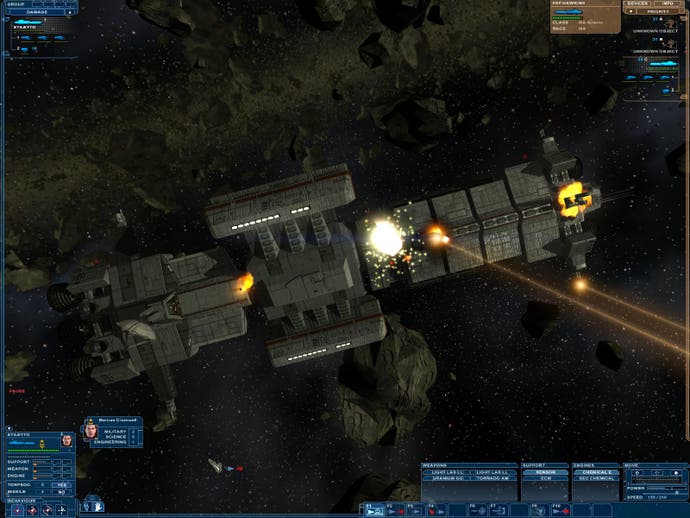
"Any time they level up they gain a point for one of three skills - military, science and engineering," Nyul explains. "A high military skill means you have better aim and your ships will do more damage so it becomes important in battle. A good science skill means your crew is much better in recognising and scanning enemy devices, so if you have a crew with a good science skill and you encounter an enemy ship then in a very short time you will get all the readouts so you can target things individually in combat.
"Meanwhile, the high engineering skill means first that in the framework of a mission you'll see things repaired at a lot higher speed, because obviously the devices can be damaged by enemy fire and you can prioritise repairs. All are useful because they give you more time to do things in battle. Secondly if you have a higher engineering skill then you will have more resource points for that unit so you can change more devices between missions."
Using your time between missions wisely makes all the difference. You get two light weapon slots to tool up, and it's crucial to pay attention to mission briefings so you can get a good idea of what to make use of; whether to bring fighter squadrons or boarding teams, which can be unleashed from the belly of your ship at a moment's notice, which sort of weapons to equip, and so on.
Hearing You Scream
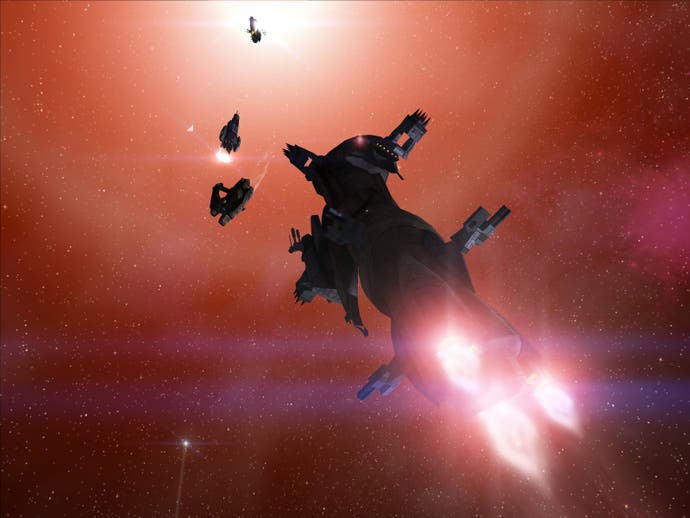
Unsurprisingly, multiplayer is also on the agenda. The single-player campaign will be the focal point for most, but the 12-player multiplayer game will brighten up LANs and Internet servers up and down the land. Mithis is including a skirmish mode where players control one unit each and fight each other, but more interesting are the missions where players control an entire fleet against a rival gamer. We were curious, however, as to how a player making use of the beginner control scheme might fare against people using the micromanagement to its full degree.
"I think that beginners have a chance fighting advanced players, but not too much," says Nyul, after a short pause. "There are obvious benefits to having the advanced options. Micromanagement is always running for both, but if you're beginner you don't control it, the AI does, so you just give some directions for what you want the AI to do, and the AI cannot be as good as a good player. It'll never be as good as a good player. The AI is always focusing on your commands, but with manual control you can deal with more than one thing at the same time so the manual control has a lot of benefits.
Perhaps equally difficult as a task was Mithis' development of the graphics engine, powered by the team's own Black Sun technology, and above all "making space look interesting," which Nyul concedes was probably the toughest obstacle during development. Using all manner of DirectX 9 trickery, the results are hugely convincing - graphically comparable to late 90s science fiction television in many respects, particularly the flare and explosion effects, the mountains of debris and the scalability. The Enterprise's Stellar Cartography has nothing on Mithis' solar system browser, which has the player zooming effortlessly between systems - real systems - and closing in to within a few hundred metres with just a few clicks and swirls of the mouse. Have a look at the screenshots dotted around here. They're not kidding.
Spaced
For a subject that evokes so much popular media, spanning books, films and TV, space combat remains an oddly tough sell for some. With Nexus though, Mithis could possibly have the keys - a single-minded approach, gorgeous visuals, a considered learning curve and a serious sci-fi tale at the heart of it all. All it needs now is for everything to come together successfully. Nyul and Vincent are confident, anyway. "It is not just a game but it is an experience, it is science fiction, so I think that it can capture the attention of those players who are hardcore strategy players, and those players who are science fiction fans, but not part of the strategy community," says Nyul. "The Sims players though? I am not so sure." We'll let you know if they're missing out closer to the game's release.
Shop for games now with Simply Games.
Nexus - The Jupiter Incident is due out on November 5th, and check back tomorrow for more from our chat with Nyul.

